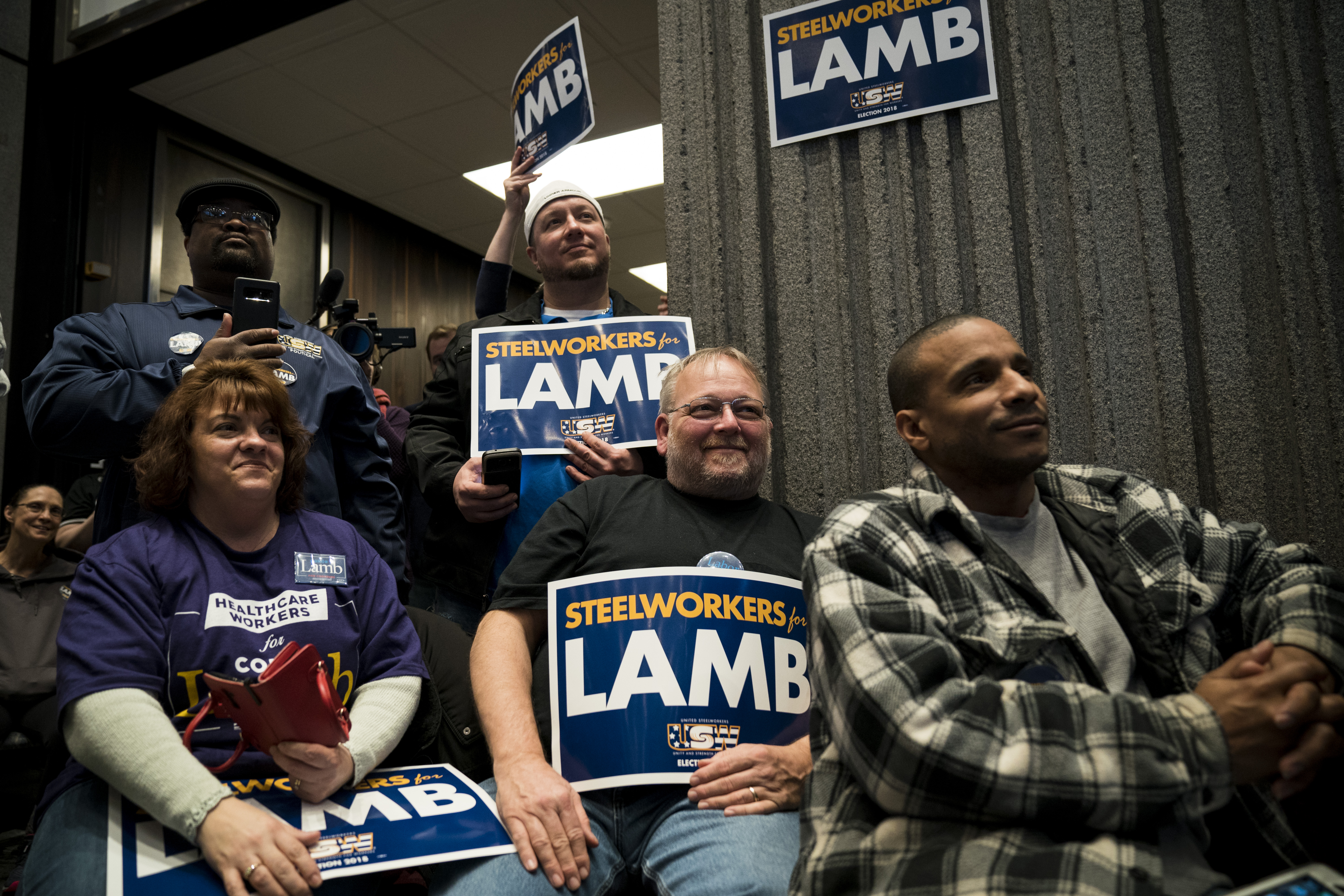Can Democrats think strategically about Trump country?
It will mean finally letting go of neoliberalism


Democrat Conor Lamb seems to have eked out a narrow victory in the special election in Pennsylvania's 18th congressional district — which President Trump won by 20 points in 2016. Far too much time, money, and attention has been lavished on this race — after all, this district is literally going to disappear when redistricting goes through before the 2018 midterms. But Lamb's victory is still a pretty impressive demonstration of just how much wind is at the Democrats' back. It also ought to serve as a reminder that if Democrats are going to win in places like western Pennsylvania, they have to formulate an ideological and political stance that reverses the last generation of weak and elitist neoliberal Democratic Party policy.
Hillary Clinton, in her trademark style featuring equal parts reasonable argument and astonishingly tone-deaf phrasing, recently all but admitted this fact. As my colleague Jeff Spross notes, as part of an explanation for why she lost the 2016 presidential election, she said: "I won the places that represent two-thirds of America's gross domestic product. So I won the places that are optimistic, diverse, dynamic, moving forward." Interpreting generously, one could read that as a tacit admission that the rest of the places that aren't on the GDP train really have been left behind, as President Trump constantly says, and that she and her party's failure to provide for those places is part of why she lost.
Regional inequality really is a big part of why the Democrats have struggled in the American hinterland in modern times. The party's shift from the New Deal to neoliberalism led to free trade and deregulation that devastated the U.S. industrial heartland around the Great Lakes. Abandonment of anti-trust meant more and more economic activity concentrated in relatively few cities, as Wall Street-coordinated mergers and acquisitions stripped the assets out of businesses in places like Indiana and Ohio so that financial wheeler-dealers in New York City could collect a quick "dynamic" buck.
The Week
Escape your echo chamber. Get the facts behind the news, plus analysis from multiple perspectives.

Sign up for The Week's Free Newsletters
From our morning news briefing to a weekly Good News Newsletter, get the best of The Week delivered directly to your inbox.
From our morning news briefing to a weekly Good News Newsletter, get the best of The Week delivered directly to your inbox.
The way "moderation" has been translated through the Democratic Party's ideological machinery up through the Obama years is "more neoliberal." That meant that the people the party ran in rural, conservative districts were often likely to support policy that would trash those very same districts. Not surprisingly, this proved to be a massive handicap when the economy melted down in 2008, and the failure of neoliberalism became undeniable. In 2010, with unemployment hovering near 10 percent, the moderate Democratic Blue Dogs were the party faction most obsessed with austerity instead of jobs, and as a direct result, they almost all got washed out of office.
But the political winds are changing.
For one thing, Trump's presidency has done precisely nothing to meaningfully help the "forgotten men and women" he vowed to fight for, as Greg Sargent demonstrates. On the contrary, the only major policy he's passed is a giant tax cut for the rich that will probably exacerbate regional inequality overall. Many districts in Trump Country are ripe for the taking.
For another thing, Lamb shows that Democrats can reach Trump country voters without going full Blue Dog. Now, he is a former prosecutor and Marine veteran who has somewhat socially conservative personal views. But his campaign also featured a sizable dose of economic populism, including withering attacks on Paul Ryan for proposed cuts to Social Security and Medicare — quite different from the typical Blue Dog focus on deficit reduction. That suggests he may be developing a new strand of "moderation" adapting to the fact that direct economic interest of the American hinterland requires a rollback of neoliberalism on all fronts.
A free daily email with the biggest news stories of the day – and the best features from TheWeek.com
Ultimately, it won't be clear just what he thinks about political economy until he gets a chance to vote on something. Once in office, he might go the Doug Jones route, and sell out his constituents with Wall Street deregulation. If that sort of thinking returns to become the governing Democratic consensus, it spells disaster for the party.
In 2006 and 2008, the Democrats won two wave elections largely because President George W. Bush was a despised failure who destroyed everything he touched. But the Democratic Party squandered these victories, largely governing by trying to return to the pre-Bush status quo. Where they did pass big reforms — namely Dodd-Frank and ObamaCare — they were moderate compromises rather than root-and-branch overhauls. On trade in particular, President Obama quickly betrayed his promise to renegotiate NAFTA, and pushed for a new horrible trade deal, the TPP.
That kind of thing is not going to cut it if the party wants to avoid getting wiped out again the next time the economy crashes, and they can't fix it due to ideological self-handicapping. The popularity of individual candidates and positions aside, it is inarguable that Democrats need a workable economic program that spreads economic benefits far and wide — and that means torching the old neoliberal orthodoxy.
Ryan Cooper is a national correspondent at TheWeek.com. His work has appeared in the Washington Monthly, The New Republic, and the Washington Post.
-
 Heavenly spectacle in the wilds of Canada
Heavenly spectacle in the wilds of CanadaThe Week Recommends ‘Mind-bending’ outpost for spotting animals – and the northern lights
-
 Facial recognition: a revolution in policing
Facial recognition: a revolution in policingTalking Point All 43 police forces in England and Wales are set to be granted access, with those against calling for increasing safeguards on the technology
-
 Codeword: December 14, 2025
Codeword: December 14, 2025The daily codeword puzzle from The Week
-
 Has Zohran Mamdani shown the Democrats how to win again?
Has Zohran Mamdani shown the Democrats how to win again?Today’s Big Question New York City mayoral election touted as victory for left-wing populists but moderate centrist wins elsewhere present more complex path for Democratic Party
-
 Millions turn out for anti-Trump ‘No Kings’ rallies
Millions turn out for anti-Trump ‘No Kings’ ralliesSpeed Read An estimated 7 million people participated, 2 million more than at the first ‘No Kings’ protest in June
-
 Ghislaine Maxwell: angling for a Trump pardon
Ghislaine Maxwell: angling for a Trump pardonTalking Point Convicted sex trafficker's testimony could shed new light on president's links to Jeffrey Epstein
-
 The last words and final moments of 40 presidents
The last words and final moments of 40 presidentsThe Explainer Some are eloquent quotes worthy of the holders of the highest office in the nation, and others... aren't
-
 The JFK files: the truth at last?
The JFK files: the truth at last?In The Spotlight More than 64,000 previously classified documents relating the 1963 assassination of John F. Kennedy have been released by the Trump administration
-
 'Seriously, not literally': how should the world take Donald Trump?
'Seriously, not literally': how should the world take Donald Trump?Today's big question White House rhetoric and reality look likely to become increasingly blurred
-
 Will Trump's 'madman' strategy pay off?
Will Trump's 'madman' strategy pay off?Today's Big Question Incoming US president likes to seem unpredictable but, this time round, world leaders could be wise to his playbook
-
 Democrats vs. Republicans: who are US billionaires backing?
Democrats vs. Republicans: who are US billionaires backing?The Explainer Younger tech titans join 'boys' club throwing money and support' behind President Trump, while older plutocrats quietly rebuke new administration
